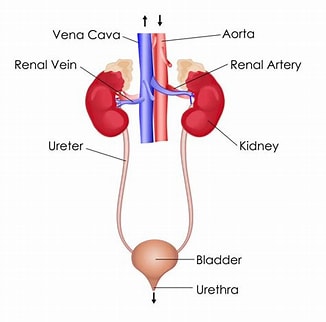A urinary tract infection (UTI) is a common infection that usually occurs when bacteria enter the opening of the urethra and multiply in the urinary tract.
UTI is among the most common types of infections in Kenya.
The urinary tract includes:
- Kidneys,
- Ureters,
- Bladder
- Urethra.

Most infections involve the lower urinary tract — the bladder and the urethra.
Symptoms
UTIs don’t always cause symptoms. When they do, they may include:
- A strong urge to urinate that doesn’t go away
- A burning feeling or pain when urinating
- Urinating often, and passing small amounts of urine
- Passing urine that looks cloudy/pus filled urine
- Passing urine that appears red, bright pink or cola-colored — signs of blood in the urine
- Strong-smelling urine
- Lower back pain
- Lower abdominal pain/supra pubic pain
- General body discomfort
- Inability to urinate despite the urge
In case the infection has ascended to the kidneys, one may experience
- Chills
- High fever
- Nausea and vomiting
- Pain below the ribs
- Loin pain and tenderness
Causes
Most UTIs are caused by a bacteria referred to as Escherichia coli (E. coli) which is a type of bacteria found in the gastro intestinal tract.
Sometimes other bacteria may also cause a UTI. The urinary system is designed to keep out bacteria. But the defenses sometimes fail, when that happens, the bacteria may grow into an infection.
Risk factors
UTIs are common in women. Many women experience more than one UTI during their lifetimes.
Risk factors for UTIs that are specific to women include:
- Female anatomy. Women have a shorter urethra than men do. As a result, there’s less distance for bacteria to travel to reach the bladder.
- Sexual activity. Being sexually active tends to lead to more UTIs. Having a new sexual partner also increases risk.
- Certain types of birth control. Using diaphragms for birth control may increase the risk of UTIs. Using spermicidal agents also can increase risk.
- Menopause. After menopause, a decline in circulating estrogen causes changes in the urinary tract. The changes can increase the risk of UTIs.
Other risk factors for UTIs include:
- Urinary tract problems. Babies born with problems with their urinary tracts may have trouble urinating. Urine can back up in the urethra, which can cause UTIs.
- Blockages in the urinary tract. Kidney stones or an enlarged prostate can trap urine in the bladder. As a result, risk of UTIs is higher.
- A suppressed immune system. Diabetes and other diseases can impair the immune system — the body’s defense against germs. This can increase the risk of UTIs.
- Catheter use. People who can’t urinate on their own often must use a tube, called a catheter, to urinate. Using a catheter increases the risk of UTIs. Catheters may be used by people who are in the hospital. They may also be used by people who have neurological problems that make it difficult to control urination or who are paralyzed.
- A recent urinary procedure. Urinary surgery or an exam of your urinary tract that involves medical instruments can both increase the risk of developing a UTI.
Complications
When treated promptly and properly, lower urinary tract infections rarely lead to complications. But left untreated, UTIs can cause serious health problems.
Complications of a UTI may include:
- Repeated infections, which means you have two or more UTIs within six months or three or more within a year. Women are especially prone to having repeated infections.
- Permanent kidney damage from a kidney infection due to an untreated UTI.
- Delivering a low birth weight or premature infant when a UTI occurs during pregnancy.
- A narrowed urethra in men from having repeated infections of the urethra.
- Sepsis, a potentially life-threatening complication of an infection. This is a risk especially if the infection travels up the urinary tract to the kidneys.
Management
Some UTIs normally go away with home remedies like drinking plenty of water which will help flush out the bacteria.
Eating plenty of fresh fruits and vegetables which will help build the immune system. However, some may need to be treated with antibiotics.
You can always reach out to us on our website https://hellodaktari.co.ke and we shall be able to treat you accordingly. We also offer Home based care services within Nairobi Kenya and its environs.
Prevention
These steps may help lower the risk of UTIs:
- Drink plenty of liquids, especially water. Drinking water helps dilute the urine. That leads to urinating more often — allowing bacteria to be flushed from the urinary tract before an infection can begin.
- Try cranberry juice. Studies that look into whether cranberry juice prevents UTIs aren’t final. However, drinking cranberry juice is likely not harmful.
- Wipe from front to back. Do this after urinating and after a bowel movement. It helps prevent the spread of bacteria from the anus to the vagina and urethra.
- Empty your bladder soon after having sex. Also drink a full glass of water to help flush bacteria.
- Avoid potentially irritating feminine products. Using them in the genital area can irritate the urethra. These products include deodorant sprays, douches and powders.
- Change your birth control method. Diaphragms, unlubricated condoms or condoms treated with spermicide can contribute to bacterial growth.
- Eat plenty of fresh fruits and vegetables. This will help to keep your immunity on check thus lowering chances of getting a UTI.
